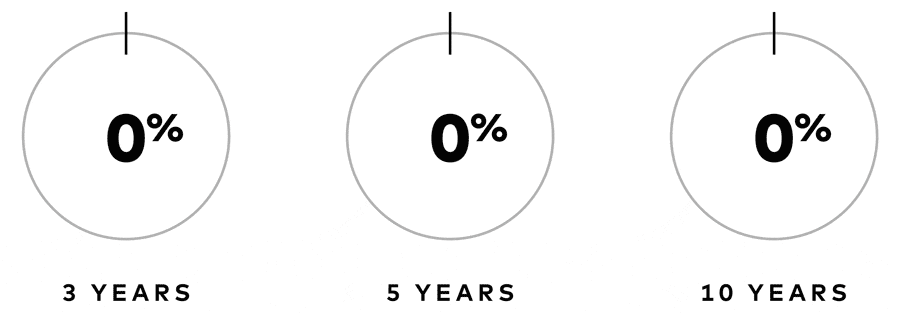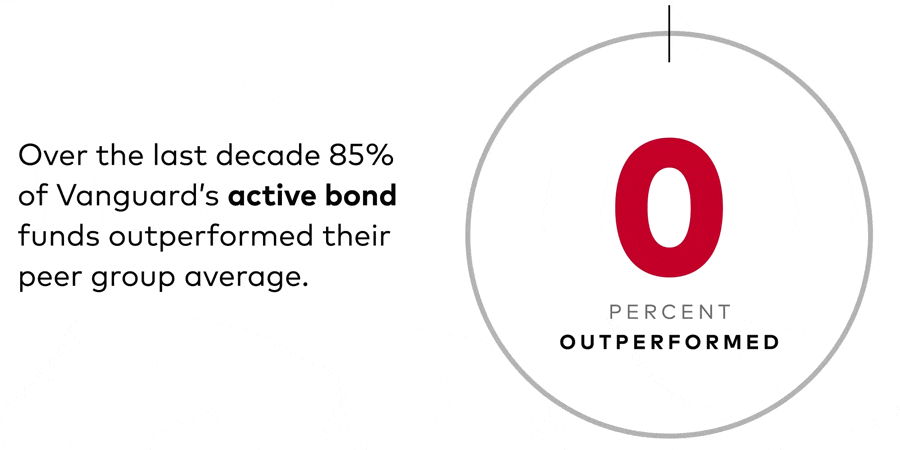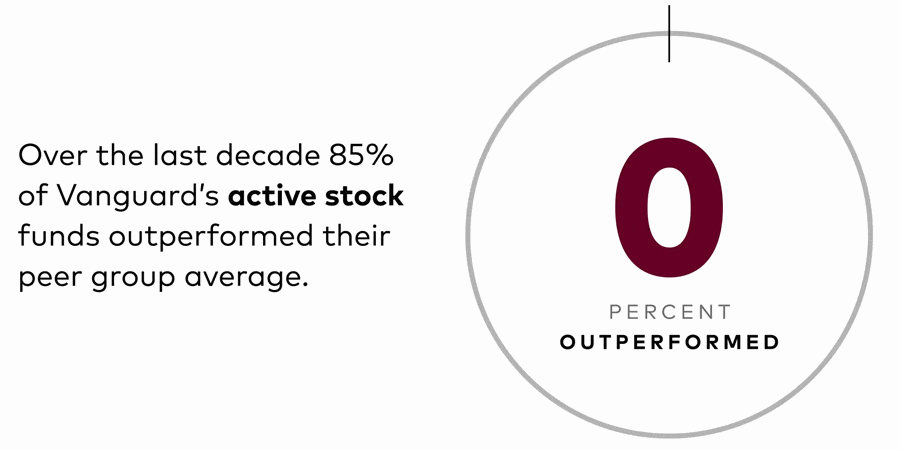The Vanguard investment story
Discipline that delivers
A message from Greg Davis, Vanguard President and Chief Investment Officer
Video transcript:
Greg Davis: Vanguard was founded on a simple but powerful idea: To take a stand for all investors, to treat them fairly, and give them the best chance for investment success. Our goal is to make it possible for everyday people to save and invest more effectively, build wealth, and achieve their financial goals.
We provide a broad range of high quality, low cost investments, including active and index strategies across equities, fixed income, money markets, multi-asset solutions, private assets, and cash. We take the same approach to managing these investments that we recommend to our clients.
Focus on what you can control. Our investment success starts with our people. We have a team of seasoned professionals who bring deep expertise and a shared commitment to our clients. The team's ability to harness cutting edge technology keeps us at the forefront of innovation to improve decision making, drive down cost, and strengthen outcomes for investors.
We have a global footprint, so we can trade around the clock, tapping into the local market expertise, while working together as one integrated team.
Our disciplined approach means we don't take on unnecessary risk with our clients’ hard-earned money. We don't compromise on our integrity for short-term gain. We only offer products that have enduring investment merit—strategies where we can add meaningful value to portfolios, not just today, but for the decades to come.
We don't chase trends—we don't speculate. We focus on what works, building portfolios designed to grow steadily over time through all kinds of markets—for all kinds of investors.
"Our investment success starts with our people. We have a team of seasoned professionals who bring deep expertise and a shared commitment to our clients."
Greg Davis
President and Chief Investment Officer
Changing the way the world invests
Our mission is a multiplier
In 1975, Vanguard transformed the investment industry by introducing a bold new model: a firm built to take a stand for all investors, to treat them fairly, and to give them the best chance for investment success. That mission continues today, carried forward by a global team of more than 450 investment professionals who bring deep expertise, discipline, and long-term perspective to a wide range of asset classes and investment strategies.
Our investment teams are steadfast in their focus to help our clients achieve the best possible outcomes. We build accountability into our process by tying portfolio managers’ compensation to the performance of the funds they oversee. We don’t take unnecessary risks with our investors’ hard-earned money for the possibility of short-term gains. And we attract the industry’s most talented professionals who want to work in a collaborative environment where we care for our investors’ assets as if they were our own.
Maximizing client outcomes with a distinct cost advantage

Source: Vanguard and Morningstar. Reflects asset-weighted average U.S. combined mutual fund and ETF expenses, as a share of 2024 average net U.S. assets. As of March 31, 2025.
Institutional quality
All investment management firms seek to outperform their competitors. Vanguard has delivered—our funds have outperformed the average returns of their peer funds over the short term and the long term.
Percentage of Vanguard funds that outperform their peer group averages

Notes: All calculations are as of September 30, 2025. For the three-year period, 5 of 6 Vanguard money market funds, 73 of 120 bond funds, 23 of 30 balanced funds, and 178 of 224 stock funds, or 279 of 380 Vanguard funds outperformed their peer group averages. For the five-year period, 6 of 6 Vanguard money market funds, 60 of 115 bond funds, 21 of 29 balanced funds, and 170 of 219 stock funds, or 257 of 369 Vanguard funds outperformed their peer group averages. For the ten-year period, 6 of 6 Vanguard money market funds, 71 of 104 bond funds, 21 of 23 balanced funds, and 178 of 193 stock funds, or 276 of 326 Vanguard funds outperformed their peer group averages. Only funds with a minimum three-, five-, or ten-year history, respectively, were included in the comparison. Results for other time periods will vary. Note that the competitive performance data shown represent past performance, which is not a guarantee of future results, and that all investments are subject to risks. For the most recent performance, visit vanguard.com/performance.
Source: LSEG Lipper.
A proven approach to investment management
Vanguard’s success is result of our mission, discipline, and highly talented investment professionals. Our experts harness deep specialization, proprietary research, advanced modeling, disciplined risk management, and sophisticated technology to guide investment decisions and drive long-term performance across a wide array of enduring exchange-traded funds (ETFs) and mutual funds.
Active fixed income
Vanguard brings more than four decades of active experience to the global bond markets, applying a rigorous and disciplined approach to risk-taking. Our deep bench of portfolio managers, traders, and credit analysts collaborate to uncover relative value, assess issuer fundamentals, and manage portfolios with long-term conviction. Rather than relying on concentrated bets, we pursue alpha through diversified, repeatable strategies informed by rigorous credit research and security selection. Our seasoned professionals—averaging over 20 years of industry experience—are focused on delivering consistent, long-term results across a broad set of active fixed income strategies that span sectors, styles, and risk profiles.

Notes: For the ten-year period ended September 30, 2025, 41 of 48 Vanguard’s active bond funds outperformed their peer group averages. Results will vary for other time periods. Only funds with a minimum ten-year history, respectively, were included in the comparison. Note that the competitive performance data shown represent past performance, which is not a guarantee of future results, and that all investments are subject to risks. For the most recent performance, visit our website at www.vanguard.com/performance.
Source: Vanguard, using data from LSEG Lipper, as of September 30, 2025.
Active equity
Vanguard’s active equity capabilities reflect a powerful combination of internal quantitative expertise and strategic partnerships with leading external managers. Our quantitative equity professionals employ proprietary models, advanced analytics, and systematic research to uncover persistent sources of return and manage risk across diverse market environments. At the same time, our external managers are selected for their differentiated investment philosophies and alignment with Vanguard’s long-term approach—operating under rigorous oversight to ensure strategic clarity and accountability. Together, these complementary strengths form a robust active equity fund lineup that seeks to deliver consistent, long-term outperformance across a full spectrum of strategies.

Notes: For the ten-year period ended September 30, 2025, 33 of 39 Vanguard’s active stock funds outperformed their peer group averages. Results will vary for other time periods. Only funds with a minimum ten-year history, respectively, were included in the comparison. Note that the competitive performance data shown represent past performance, which is not a guarantee of future results, and that all investments are subject to risks. For the most recent performance, visit our website at www.vanguard.com/performance.
Sources: Vanguard, using data from LSEG Lipper, as of September 30, 2025.
Index fixed income
A pioneer in bond indexing, Vanguard brings a disciplined, research-driven approach to fixed income index management—one that draws on global scale, proprietary sampling techniques, and deep market insight. Our portfolio teams continuously assess liquidity, issuer fundamentals, and structural market dynamics to maintain tight tracking to the benchmark. They align portfolios with the benchmark’s key risk-factor exposures—such as duration, credit quality, and sector composition—and manage transaction costs with precision. This approach is designed to support consistent performance across a range of market conditions.
Index equity
Vanguard is widely recognized as the global leader in index equity investing. Since launching the first index mutual fund in 1976, Vanguard has set the standard for index investing. We manage our index equity portfolios with precision—applying refined replication and optimization techniques, maintaining tight tracking across market conditions, and taking a measured approach to securities lending. Our approach eliminates reliance on star managers, helping to reduce key person risk and reinforce process-driven consistency. Our portfolio managers, who also serve as traders, strategically combine deep expertise, sophisticated liquidity sourcing, proprietary trading techniques, and advanced technology to deliver the consistent performance that has long defined Vanguard’s index equity lineup—and helped millions of investors stay on track toward their long-term goals.

Notes: For the 10-year period ended September 30, 2025, 30 of 56 Vanguard bond index funds, 16 of 18 Vanguard balanced index funds, and 145 of 154 Vanguard stock index funds—for a total of 191 of 228 Vanguard index funds—outperformed their Lipper peer-group averages. Results will vary for other time periods. Only index mutual funds and ETFs with a minimum 10-year history were included in the comparison. Note that the competitive performance data shown represent past performance, which is not a guarantee of future results, and that all investments are subject to risks. For the most recent performance, visit our website at www.vanguard.com/performance.
Source: Vanguard, using data from LSEG Lipper, as of September 30, 2025.
Capital Markets
Vanguard’s capital markets professionals ensure efficient access to global markets, managing ETF primary market activity, monitoring secondary market liquidity, and engaging with market participants to optimize execution quality. Their work supports tight spreads, low tracking error, and robust fund performance across asset classes and drives innovation in product design and trading infrastructure. They continuously refine processes to adapt to evolving market structures and regulatory environments—ensuring that Vanguard funds operate with precision, transparency, and resilience.
Enduring Investments
Superior performance is an important goal, but how a company arrives at that goal is just as important. Our focus on the long-term needs of our clients requires us to take a disciplined, risk-controlled approach to managing their assets. We adhere to our stated mandates and don't assume undue risks with our investors’ money or compromise our integrity for short-term gain. Instead, we design and manage enduring, high-quality investments that strive to generate superior, sustained long-term performance.
We continually look for opportunities to lower the cost of our investments. Research shows that lower-cost investments outperform on average—which means that the more we drive down costs, the better investors’ chances are for long-term investment success.1
Our approach delivers long-term value beyond performance—providing the reliability and consistency that have served our clients well for decades.
Investment research
Vanguard harnesses diversity of thought, deep and varied expertise, and proprietary models to lead the advancement of investment thinking and practice in the asset management industry. Our perspectives are relevant and rigorous, steeped in empirical research, and drawn from over 50 years of investment expertise. Vanguard’s in-house research team includes a global team of economists, investment strategists, behavioral researchers, household finance experts, and quantitative investment analysts. They produce relevant and rigorous insights on economics, capital markets, portfolio strategies, retirement matters, and investor behavior to improve investor decision-making.
Product development and oversight
Vanguard’s Portfolio Review Department plays a central role in developing and maintaining the integrity and consistency of our investment portfolios. By combining rigorous evaluation with a commitment to continuous improvement, our experts help ensure that every Vanguard fund reflects the discipline, transparency, and long-term focus that define our distinct investment approach. Our experts engage with internal and external managers to evaluate performance, monitor risk exposures, and ensure alignment with Vanguard’s investment philosophy.
A rigorous process guides every product launch
All of our mutual funds and ETFs are built for the long term and designed with our clients’ needs in mind. We weigh each product idea against a consistent set of standards to help us determine which products to launch.
As we evaluate product ideas, we ask ourselves these questions:
- Does the product have enduring investment merit?
Vanguard avoids speculative investments and short-term fads. Instead, we focus on asset classes that earn positive, real returns from dividends, interest, and other sources of regular cash flows.
- Does the product fulfill the long-term needs of its targeted clients?
As a global company, we don’t take a one-size-fits-all approach to launching products. Instead, we adhere to a targeted strategy. We aim to launch products that satisfy the needs and preferences of specific client types—and we also evaluate clients to ensure that the product is appropriate for their long-term needs.
- Can we deliver a compelling advantage over competitors?
Vanguard is known for its pioneering funds and long-term outperformance. We thoroughly assess the attributes of each product with the goal of introducing those that will stand out in the marketplace and have the long-term success our clients have come to expect.
- Is it feasible to launch the product?
We will launch a product only after a thorough analysis of any legal and regulatory constraints, along with any risks we may face.
Learn more about our offers
1 Wallick, Daniel W., Brian R. Wimmer, and James J. Balsamo, 2015. Shopping for Alpha: You Get What You Don’t Pay For. Valley Forge, Pa.: The Vanguard Group.
Notes:
For more information about Vanguard funds and ETFs, visit vanguard.com to obtain a prospectus or, if available, a summary prospectus. Investment objectives, risks, charges, expenses, and other important information are contained in the prospectus; read and consider it carefully before investing.
Vanguard ETF Shares are not redeemable with the issuing Fund other than in very large aggregations worth millions of dollars. Instead, investors must buy and sell Vanguard ETF Shares in the secondary market and hold those shares in a brokerage account. In doing so, the investor may incur brokerage commissions and may pay more than net asset value when buying and receive less than net asset value when selling.
All investing is subject to risk, including the possible loss of the money you invest.
Diversification does not ensure a profit or protect against a loss.
Investments in bonds are subject to interest rate, credit, and inflation risk.
"Institutional quality" in this context is meant to convey a level of professional rigor and expertise combined with low costs.
50 million investors as of December 31, 2024.